Thursday, 15 January 2009
 What is known in Canada’s province that is not a province like the others as "Sondage Nanos" has released two intriguing opinion polls over the past several days. They suggest the prorogued 40th Parliament that will return to life on January 26 will not be a cakewalk for any of the parties involved. On the one hand, if the opposition majority in the elected Canadian House of Commons actually does defeat the government over an insufficiently stimulative budget at the end of this month, 49% of Nanos poll respondents Canada-wide would like to see a fresh election. Only 42 % believe "Gov. Gen. Michaelle Jean should invite the opposition parties to form a coalition," without an election. If an election were held, on the other hand, another Nanos poll has put the Liberals at 34% Canada-wide, the Conservatives at 33%, the New Democrats at 19%, and the Green Party at 7%. Yet another recent poll by Ipsos Reid shows better results for the Conservatives — but still notably less than the astonishing 45% support they seemed to win in the initial hysteria Mr. Harper spread over the "socialist and separatist" coalition plot. Meanwhile, the Assembly of First Nations has discovered that it needs a stimulus package too ... What is known in Canada’s province that is not a province like the others as "Sondage Nanos" has released two intriguing opinion polls over the past several days. They suggest the prorogued 40th Parliament that will return to life on January 26 will not be a cakewalk for any of the parties involved. On the one hand, if the opposition majority in the elected Canadian House of Commons actually does defeat the government over an insufficiently stimulative budget at the end of this month, 49% of Nanos poll respondents Canada-wide would like to see a fresh election. Only 42 % believe "Gov. Gen. Michaelle Jean should invite the opposition parties to form a coalition," without an election. If an election were held, on the other hand, another Nanos poll has put the Liberals at 34% Canada-wide, the Conservatives at 33%, the New Democrats at 19%, and the Green Party at 7%. Yet another recent poll by Ipsos Reid shows better results for the Conservatives — but still notably less than the astonishing 45% support they seemed to win in the initial hysteria Mr. Harper spread over the "socialist and separatist" coalition plot. Meanwhile, the Assembly of First Nations has discovered that it needs a stimulus package too ...
Canadian regionalism still hard at work ...
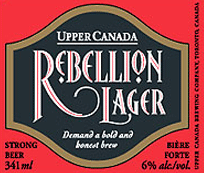 Whatever else, the traditional regional tensions of the Canadian confederation still have a lot to do with the current political puzzle in Ottawa. In the case of the Nanos poll on "what should happen if the Harper government is defeated over this month's budget ... ‘What is striking about the numbers is the regional differences,’ said pollster Nik Nanos. Whatever else, the traditional regional tensions of the Canadian confederation still have a lot to do with the current political puzzle in Ottawa. In the case of the Nanos poll on "what should happen if the Harper government is defeated over this month's budget ... ‘What is striking about the numbers is the regional differences,’ said pollster Nik Nanos.
"In Quebec, 62 per cent wanted the opposition parties to have a chance to govern, while 30 per cent wanted an election called ... Those numbers were reversed in western Canada, where 65 per cent wanted an election and only 29 per cent favoured an opposition coalition ... Ontario and Atlantic respondents were more closely split, with 46 per cent and 49 per cent respectively favouring an election. Forty per cent in both regions favoured a coalition government ... ‘In a way, this is a bit like an old movie in Canadian politics ... ‘ said Nanos."
Similarly, in the Nanos poll on current voter intentions in a fresh election, the "Liberal resurgence was particularly pronounced in Quebec, where the poll indicates the party vaulted into the lead with 39 per cent support to 29 per cent for the Bloc Québécois, 17 per cent for the Tories and 14 per cent for the New Democrats."
In the rest of the country, "Liberals expanded their lead in Atlantic Canada (44 per cent to the Tories' 28) and regained a narrow lead in Ontario (39 per cent to the Tories' 35 and the NDP's 16) ... The Conservatives continued to dominate western Canada, with 44 per cent to the Liberals' 24 per cent and the NDP's 23 per cent." (Again, note how the Liberals and NDP are almost even in the West — which may help explain why the Liberal-NDP coalition concept is still not quite as dead as Conservative partisans would like it to be. Note too that, on this reading, even in the West the combined Liberal-NDP vote is actually slightly above the Conservative vote!)
Out west they seem to be reading different polls?
 It says something about Canadian regionalism as well that at the same time as the Globe and Mail in Toronto, Le Devoir in Montreal, and the Chronicle Herald in Halifax were reporting on the Nanos election poll (which put the Liberals at 34% Canada-wide and the Conservatives at 33%), the Calgary Herald was reporting on a rather different Ipsos Reid poll. It says something about Canadian regionalism as well that at the same time as the Globe and Mail in Toronto, Le Devoir in Montreal, and the Chronicle Herald in Halifax were reporting on the Nanos election poll (which put the Liberals at 34% Canada-wide and the Conservatives at 33%), the Calgary Herald was reporting on a rather different Ipsos Reid poll.
According to the Ipsos Reid poll, "the popularity of the federal parties is back to numbers — within the margin of error — where each stood after the last two elections ... The Conservative party, which scored as high as 45 and 46 per cent in two polls in December after the opposition parties forged a coalition agreement, would capture 39 per cent of the vote if an election were held today, the poll said .
"The Liberals, now led by Michael Ignatieff, would score 28 per cent, up two points from the last survey; the New Democrats would garner 15 per cent, up three points; the Green Party nine per cent, up two points; and the Bloc Quebecois eight per cent, up two points ... In Quebec, the Bloc had 35 per cent support and the Liberals 32 per cent. The Conservatives were a distant third at 19 per cent, followed by the NDP at seven per cent and the Greens at seven per cent."
All this of course also does make you wonder just how reliable any poll actually is at any point in time — even allowing that the pollsters’ record in predicting Canadian elections generally has been impressive enough for a number of decades now.
 What does seem clear in both the recent Nanos and Ipsos Reid polls is that (as David Frum of all people predicted even before the holiday season was fully in motion), the initial dramatic surge in Conservative support after what might be rather long-windedly called the financial-update-opposition-coalition-prorogation crisis of late November and early December has not lasted. What does seem clear in both the recent Nanos and Ipsos Reid polls is that (as David Frum of all people predicted even before the holiday season was fully in motion), the initial dramatic surge in Conservative support after what might be rather long-windedly called the financial-update-opposition-coalition-prorogation crisis of late November and early December has not lasted.
Stephen Harper, like everyone else in Ottawa, is walking on eggs again. And no one can really say just what might happen to Canada’s 40th Parliament over the next several months. It is the economy stupid, no doubt. But, for better or worse, that doesn’t mean that politics is dead.
So ... what about the coalition anyway?
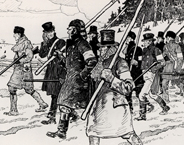 For what it’s worth, at this exact moment I do share the wider feeling that the real prospects of the opposition majority’s actually defeating the Harper minority government at the end of this month probably are quite slender. The most you might get is a combined vote against the government by the NDP and the Bloc, accompanied by a strategic Liberal abstention. For what it’s worth, at this exact moment I do share the wider feeling that the real prospects of the opposition majority’s actually defeating the Harper minority government at the end of this month probably are quite slender. The most you might get is a combined vote against the government by the NDP and the Bloc, accompanied by a strategic Liberal abstention.
A Liberal abstention could be bolstered by some version of the argument that while the Liberals still do not feel that the Conservatives have economic policy right, another political crisis at this exact moment will only do still more harm to the Canadian economy. Consider the recent descent of the Canadian dollar here — to say nothing of the provincial premiers who have descended upon Ottawa today, with their "shovel-ready" infrastructure projects in hand, etc, etc.
With the last election only some three and a half months away (the argument might carry on), the Conservatives still deserve more of a chance to get their economic policy right. And for the moment even Michael Ignatieff’s Liberals are going to be good enough sports to give Mr. Harper his chance. Noblesse oblige and all that — which is probably also a good enough argument among the traditional Liberal constituencies of Canadian moderation and compromise, especially in Ontario and Atlantic Canada.
Alternatively, the Liberals might actually vote for the budget — if it contains so many progressive bows to the creative role of government in the free-market economy in times of high stress as to make even abstaining from a supporting vote seem excessively partisan and too narrowly perverse.
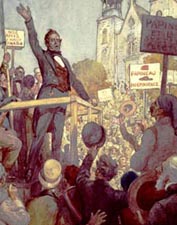 (Note here such recent headlines as: "Conservatives plan C$40 billion budget [deficit]: report" ; "Harper wants co-operation in drafting budget" ; "Ignatieff sets conditions for budget support" ; and "Liberals set terms for budget support ... Tories must boost productivity, infrastructure and protect the most economically vulnerable." And then again, there is the Carole Taylor advisory committee, as discussed at greater length below.) (Note here such recent headlines as: "Conservatives plan C$40 billion budget [deficit]: report" ; "Harper wants co-operation in drafting budget" ; "Ignatieff sets conditions for budget support" ; and "Liberals set terms for budget support ... Tories must boost productivity, infrastructure and protect the most economically vulnerable." And then again, there is the Carole Taylor advisory committee, as discussed at greater length below.)
At the same time yet again, if the Liberals grow too friendly towards the Conservative minority government, their allegedly "socialist and separatist" colleagues in the NDP and the Bloc will not be pleased. And despite what the most resolute Conservative partisans suggest, the coalition concept has not been so much of a failure that Mr. Ignatieff would be well advised to forget about it altogether. There is an argument at the moment as well that it is in the interests of both the Liberals and the NDP for their coalition friendliness to continue in some degree — and conceivably some version of a similar argument even applies to the Bloc Quebecois.
(And here we have such headlines as "Coalition can deal with crisis, Duceppe says" ; "NDP 'unlikely' to support budget, favours coalition" ; "Window for defeating Harper minority government closing, says NDP" ; "Civil servant's move seen as boost for Ignatieff"; and such recent reportage as: "Liberal Leader Michael Ignatieff and Jack Layton, leader of the New Democratic Party, met over coffee for more than an hour Tuesday to discuss the upcoming session of Parliament, the budget and the opposition coalition ... Ignatieff spokeswoman Jill Fairbrother said Ignatieff has not changed his position that the Liberals will not operate as part of a coalition from day to day, but he would gladly lead a coalition government if the government is defeated and the Governor General asks the opposition to form an alternative government.")
Whatever else is right, Tom Flanagan is wrong!
 Finally, there is the argument in last Friday’s Globe and Mail from Mr. Harper’s one-time guru Tom Flanagan at the University of Calgary, misleadingly entitled "Only voters have the right to decide on the coalition." Finally, there is the argument in last Friday’s Globe and Mail from Mr. Harper’s one-time guru Tom Flanagan at the University of Calgary, misleadingly entitled "Only voters have the right to decide on the coalition."
Mr. Flanagan was born and raised in the United States. And, as lamentably small-minded as pointing to such things inevitably is, his continuing addiction to the assumptions of the US political system may nonetheless be the only altogether sensible, non-partisan explanation of why he does not finally seem to understand what "democracy" means in the Westminster parliamentary tradition — which Canada has inherited from the United Kingdom, and which remains a part of the Canadian Constitution, whatever else may or may not be true.
In any case, to say as Mr. Flanagan does that, nowadays, "in the area of choosing the executive, the Constitution, for all practical purposes, is whatever the Governor-General says it is," simply suggests that he has not kept up with the real Canadian Constitution, and the related international traditions of parliamentary democracy in the global village, in such places as Australia, India, Ireland, and Trinidad and Tobago.
Similarly, to say that the coalition concept amounts to what Mr. Flanagan calls "a head-spinning violation of democratic norms of open discussion and majority rule" is itself an astonishingly head-spinning violation of democratic norms of open discussion and majority rule. With gurus of this sort it is no wonder that Mr. Harper himself sometimes seems to have so little respect for the real traditions of democracy in Canada. (And, in my worst moments, concealing this lack of respect does seem to me the only logical point of Mr. Flanagan’s article in last Friday’s Globe and Mail!)
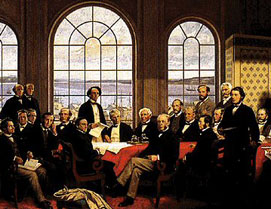 To me, at any rate, as someone reared on Canadian political traditions as understood in the ancient region of Ontario, what Mr. Flanagan is saying is altogether unbelievable as serious political science — as opposed to mindlessly aggressive and mean-spirited right-wing partisan polemic. The simple truth is that Mr. Harper does NOT have a democratic majority in the Parliament of Canada. And he and his party certainly won nothing like a democratic majority of the popular vote in the last Canadian federal election, on October 14, 2008. To me, at any rate, as someone reared on Canadian political traditions as understood in the ancient region of Ontario, what Mr. Flanagan is saying is altogether unbelievable as serious political science — as opposed to mindlessly aggressive and mean-spirited right-wing partisan polemic. The simple truth is that Mr. Harper does NOT have a democratic majority in the Parliament of Canada. And he and his party certainly won nothing like a democratic majority of the popular vote in the last Canadian federal election, on October 14, 2008.
It is because Mr. Harper does not have a majority in Parliament — while the combined opposition parties do (and again as a result of the democratic decision of the majority of the Canadian people, on October 14, 2008) — that it is quite possible, and altogether constitutionally legal and proper, for the opposition parties to ultimately replace Mr. Harper and his minority government with a government that does command majority support in Parliament. That is exactly what "democratic norms of open discussion and majority rule" mean in a parliamentary democracy. And as Mr. Harper has himself acknowledged on various occasions, Canada today is, above all else, a parliamentary democracy.
For a variety of other reasons, it may in fact be better to have a fresh election if the opposition parties do unite to defeat Mr. Harper’s government any time soon, rather than have the Liberals and New Democrats try to form a coalition government, supported by the Bloc Quebecois. And it is true enough that this decision under our Constitution does finally fall into the lap of the excellent Governor General Michaelle Jean. But this is quite different from saying that "in the area of choosing the executive, the Constitution, for all practical purposes, is whatever the Governor-General says it is."
 I would argue myself, quite passionately, that given this particular power of the Governor General, which we have only rarely had the opportunity to see in actual practice in our history — a sign itself of just how unusual our federal politics are at the moment — the office ought to be filled in a much more democratic way than it is now. I would argue myself, quite passionately, that given this particular power of the Governor General, which we have only rarely had the opportunity to see in actual practice in our history — a sign itself of just how unusual our federal politics are at the moment — the office ought to be filled in a much more democratic way than it is now.
The Governor General, that is to say, is currently appointed by the Canadian prime minister of the day — which makes it very difficult for any particular governor general to disagree with the prime minister of the day, whoever that may be. The office ought to be filled by some form of democratic election, as the comparable office is in such Westminster-model parliamentary democracies as Ireland and India, e.g.
But this has nothing to do with anything Mr. Flanagan has said in his January 9, 2009 column in the Globe and Mail. And, whatever else again, if we in Canada are going to start actually listening to people like Mr. Flanagan in making decisions about our political culture, I think we will have moved in the exact opposite of any kind of seriously democratic direction. (And I for one would start thinking about moving to Barack Obama’s United States! Well, for a few minutes at any rate — just before joining another near-great Upper Canadian Rebellion, this time against Mr. Flanagan, and the aspiring new Tory Oligarchy in Alberta.)
Earlier report, January 8: GRITS ABSTAIN ON PRINCIPLE .. the ultimate opposition answer to Harper’s dubious prorogation?
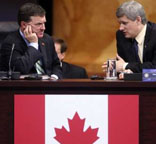 Even most quite civic-minded ordinary Canadian voters are not paying at all as much attention to the potential hi-jinks in Ottawa at the end of the first month of 2009 as the country’s several thousand rabidly confirmed political junkies. Pollsters still seem to be reporting that the electorate’s patience with any kind of partisan jockeying understandably remains thinner than ever. Like most other parts of the world today, most parts of Canada have economic problems of one sort or another. That’s what the people want their political leaders to dwell on. Even most quite civic-minded ordinary Canadian voters are not paying at all as much attention to the potential hi-jinks in Ottawa at the end of the first month of 2009 as the country’s several thousand rabidly confirmed political junkies. Pollsters still seem to be reporting that the electorate’s patience with any kind of partisan jockeying understandably remains thinner than ever. Like most other parts of the world today, most parts of Canada have economic problems of one sort or another. That’s what the people want their political leaders to dwell on.
So (right now at any rate) the prospect that a Liberal-New Democrat coalition, backed by the Bloc Quebecois, will defeat Stephen Harper’s Conservative minority government at the end of this month — even over a federal budget that fails to dwell on the country’s economic problems adequately — does seem to be getting dimmer and dimmer. The opposition majority does not want yet another fresh election, and still does not seem to have enough wider public support to successfully replace the Harper Tories without an election, even if this is constitutionally quite proper. All three opposition parties need a new strategy. Having the Liberals abstain on key votes in the 40th Parliament, as a matter of principle, with at least the de facto blessing of both the NDP and the BQ, may (or may not) be just what the doctor of political science ordered.
Say whatever else you like, the Liberals would be crazy to trust Stephen Harper now ...
 Insofar as such a thing can be discerned from his mercurial movements, Stephen Harper’s strategy for dealing with the returning new Parliament, that he dubiously prorogued to avoid losing a vote of confidence late last year, seems to envision some allegedly centrist collaboration between his minority Conservatives and the new Michael Ignatieff Liberals — against the "socialist and separatist" hordes (i.e., the New Democrats and the Bloc Quebecois). Insofar as such a thing can be discerned from his mercurial movements, Stephen Harper’s strategy for dealing with the returning new Parliament, that he dubiously prorogued to avoid losing a vote of confidence late last year, seems to envision some allegedly centrist collaboration between his minority Conservatives and the new Michael Ignatieff Liberals — against the "socialist and separatist" hordes (i.e., the New Democrats and the Bloc Quebecois).
To lock this plot in, Mr. Harper has organized an extra-parliamentary advisory committee on the (more or less?) troubled Canadian economy, headed by former BC finance minister Carole Taylor, and including such business luminaries as Paul Desmarais of the Montreal-based Power Corporation. Vaguely following the model of former Liberal cabinet minister John Manley’s committee on Afghanistan a while back, the thought here appears to be that the Taylor committee’s advice on the budget which Conservative finance minister Jim Flaherty is introducing at the end of this month will make it very difficult for the Ignatieff Liberals to vote against the budget document in Parliament.
It may be that the Liberals finally will go along with the late January 2009 budget, because it does seem that the majority of the electorate wants the politicians in Ottawa to co-operate, and so forth — and because there will be enough Liberal-friendly measures in the budget plan to help the medicine go down without too much heartburn. Yet for the Liberals to indefinitely support the (still) minority Conservatives as a matter of policy clearly makes no sense at all — at least as far as any reasonable configuration of Canadian Liberal interests and values goes.
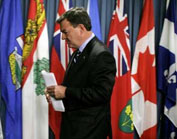 If the Harper Conservatives were more like the old Progressive Conservatives of John Diefenbaker, or even Brian Mulroney — and if the New Democrats and Bloquistes really were hard-line socialists and separatists, altogether averse to free markets and/or Canada — there might be a case for an unholy Liberal-Conservative alliance of the sort Mr. Harper sometimes seems to be proposing. (The official name of John A. Macdonald’s party, back in the confederation era, e.g., actually was "Liberal-Conservative.") If the Harper Conservatives were more like the old Progressive Conservatives of John Diefenbaker, or even Brian Mulroney — and if the New Democrats and Bloquistes really were hard-line socialists and separatists, altogether averse to free markets and/or Canada — there might be a case for an unholy Liberal-Conservative alliance of the sort Mr. Harper sometimes seems to be proposing. (The official name of John A. Macdonald’s party, back in the confederation era, e.g., actually was "Liberal-Conservative.")
But none of these things is really even half-true. Mr. Harper himself has, arguably enough, time and again shown that one of his few clear objectives in political life is the effective destruction of the Canadian Liberal tradition, and everything it has stood for in the country’s past — from Wilfrid Laurier and Mackenzie King, all the way to Lester Pearson, Pierre Trudeau, and Jean Chretien. If there are any lingering doubts that this remains a key passion for him, he and his former Ontario aggressively right-wing finance minister Jim Flaherty dispelled them with this past November’s almost insanely ideological financial update, which precipitated the opposition majority coalition experiment, the dubious prorogation of Parliament, and the new kind of economic-stimulus budget that is apparently now being promised for the end of this month.
Moreover, even if you still don’t believe that such ideological subtleties and hidden agendas still do lurk in the mind of Stephen Harper’s Conservative Party of Canada, just as a much more down-to-earth matter of practical politics it makes no sense at all for the Liberals to in any way systematically support the Conservative minority government in the 40th Parliament of Canada. If they do, in the next election Mr. Harper will logically enough just urge that the Liberals don’t really oppose his policies. They lack policies of their own, and there is no reason to vote for them instead of the Harper Conservatives. It doesn’t take a political rocket scientist to appreciate that only a Liberal Party of Canada which actually wanted to self-destruct could warm to the ham-handed overtures Mr. Harper has seemed to be making over the past several weeks.
Liberals abstaining, with at least tacit support of NDP and BQ, would put opposition majority in ultimate driver’s seat, while giving Harper Tories a fair chance to deal with economic problems (as voters tell pollsters they want?)...
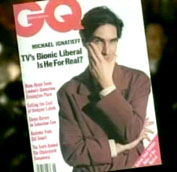 As it happens, the kind of new strategy both the Ignatieff Liberals and their coalition partners from this past fall arguably need has already had some intermittent dress rehearsals under former Liberal leader Stephane Dion. To "avoid an election" while retaining what at least some would see as enough shreds of their policy integrity in the last months of 2007, e.g., "Liberals abstained from all confidence votes in the fall session of Parliament." As it happens, the kind of new strategy both the Ignatieff Liberals and their coalition partners from this past fall arguably need has already had some intermittent dress rehearsals under former Liberal leader Stephane Dion. To "avoid an election" while retaining what at least some would see as enough shreds of their policy integrity in the last months of 2007, e.g., "Liberals abstained from all confidence votes in the fall session of Parliament."
Abstaining here means that the Liberal party simply does not show up to vote on key issues, or questions involving so-called confidence votes that could defeat the Conservative minority government. And especially in the 40th Parliament elected this past October, if the Liberals do not show up to vote, the other opposition parties — the NDP and the BQ — do not have at all enough votes to defeat the government.
As matters stand, the Conservatives now have 143 seats in the elected Canadian House of Commons. The NDP and BQ together have only 86. If you add the Liberals to the NDP and BQ combined total, all three opposition parties have 163 seats. And they can easily enough defeat the Harper Conservatives whenever they like. But when the Liberals abstain, en masse and on principle, the Conservatives have what amounts to a temporary de facto majority government.
In the difficult perpetual minority parliaments that the people of Canada in their wisdom have elected in the last three consecutive federal elections, having a Liberal official opposition abstain from confidence votes is at least a way of making Parliament work. The Liberals more or less stumbled into this approach in the 39th Parliament, after the Bloc Quebecois lost interest in sustaining the first Harper Conservative minority government.
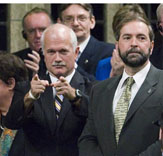 Back under Dion’s leadership, many observers, inside and outside the Liberal Party, eventually came to see the abstaining strategy as a mark of weakness. But this was only seriously damaging when the other opposition parties — and especially the New Democrats — pressed the point. There is at least an argument now that the Liberal-NDP coalition agreement of this past fall has altered the political dynamics on this front. Back under Dion’s leadership, many observers, inside and outside the Liberal Party, eventually came to see the abstaining strategy as a mark of weakness. But this was only seriously damaging when the other opposition parties — and especially the New Democrats — pressed the point. There is at least an argument now that the Liberal-NDP coalition agreement of this past fall has altered the political dynamics on this front.
It may not be wise at the moment for any Liberal-NDP coalition, supported by the BQ, to actually defeat the second Harper Conservative minority government, and avoid a fresh election that no one wants by forming an alternative government, that can reliably command majority support in the House. Yet especially given the current economic troubles — and their apparent likely deepening over at least the first two quarters of 2009 (and conceivably considerably longer?), it may make quite a lot of sense for all three opposition parties to avoid a fresh election by quietly supporting a Liberal policy of abstaining on crucial or confidence votes, that could defeat the government, as a matter of high principle.
In this way the NDP and BQ could consistently oppose any over-aggressive right-wing policies that the Harper government might want to force down the throats of the more progressive parties in Parliament. The Liberals could also get out from under being tainted with support for such policies. The Conservatives could govern as if they did in fact have a majority government. And the Canadian people could finally see just how ineffective (or otherwise, of course) this kind of majority government would be. The opposition parties would be giving Mr. Harper just enough rope to hang himself with. And they would retain the ability to finally defeat the government, when its policies became too objectionable, and the polls finally showed that getting rid of Mr. Harper is what a clear majority of the electorate, even in key parts of Western Canada, really does want.
Of course, this kind of strategy does have its fair share of potential flaws and difficulties. Chantal Hébert, e.g., has just reported in the Toronto Star that all federal parties are quietly expecting there will in fact be a fresh election at some point in 2009. The 40th Parliament remains essentially unstable, and Mr. Harper’s almost insane fiscal update last fall may have poisoned the well beyond all redemption. For a Liberal abstaining strategy to work over any length of time, it would need at least the de facto support of the other two opposition parties. This requires that something of the spirit of the late 2008 opposition majority coalition will survive into 2009 and beyond. And this may finally prove not at all realistic. (It may even all too idealistically assume, e.g., that in the next federal election Liberals and New Democrats will at least not be the kinds of over-aggressive progressive competitors that they have been in the last two elections.)
 At the same time, it may also be astonishingly naive to imagine that high-minded rhetoric about how all the parties in Canada’s federal parliament (or at least the most serious or so-called "adult" parties) should just co-operate and get along will ever deliver any even half-enduring mid-term of stable government to the wild west show in Ottawa these days. And strong Conservative partisans should perhaps think a little harder about the proposition that the most fundamental problem is the essentially authoritarian leadership style of Stephen Harper himself. At the same time, it may also be astonishingly naive to imagine that high-minded rhetoric about how all the parties in Canada’s federal parliament (or at least the most serious or so-called "adult" parties) should just co-operate and get along will ever deliver any even half-enduring mid-term of stable government to the wild west show in Ottawa these days. And strong Conservative partisans should perhaps think a little harder about the proposition that the most fundamental problem is the essentially authoritarian leadership style of Stephen Harper himself.
If what Canada really needs right now is a year and a half or more of stable government in Ottawa, focused on the increasingly serious economic troubles of the Canadian people, the only realistic way of achieving such a goal (short of an immediate fresh election, which returns a Harper majority government — which none of the opposition parties is presumably crazy enough to facilitate) may very well be a Liberal strategy of abstaining from key parliamentary votes on principle, with the connivance of the New Democrats and Bloc Quebecois (who will almost certainly almost always vote against the government?).
Mr. Harper may not like this kind of strategy, because it does leave the ultimate decision about when the next federal election will take place (beyond fixed-date election laws that are apparently not all that serious, after all) in the hands of the opposition parties — and especially in the hands of the Ignatieff Liberals. (Remember how annoyed Mr. Harper became with the "dysfunctional" 39th Parliament, when Stephane Dion started talking about how he would decide when to defeat the first Conservative minority government?)
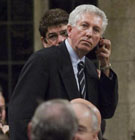 On the other hand, this kind of strategy would give Mr. Harper a somewhat prolonged taste of something very close to the majority government he craves. And it does remain a hard political fact that the Canadian people did not quite give him this sort of government even in this past October`s election. The people did democratically decide that the opposition parties can, if they so choose, finally unite to defeat Mr. Harper`s government. And in the 40th Parliament of Canada we do still have for the moment, there is ultimately no escaping that democratic choice. On the other hand, this kind of strategy would give Mr. Harper a somewhat prolonged taste of something very close to the majority government he craves. And it does remain a hard political fact that the Canadian people did not quite give him this sort of government even in this past October`s election. The people did democratically decide that the opposition parties can, if they so choose, finally unite to defeat Mr. Harper`s government. And in the 40th Parliament of Canada we do still have for the moment, there is ultimately no escaping that democratic choice.
Only registered users can write comments.
Please login or register. Powered by AkoComment 1.0 beta 2!
|
